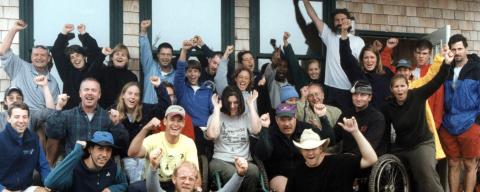The mission of Northeast Passage is to empower people living with disabling conditions, both visible and invisible, to define, pursue and achieve whole life health, community engagement and fulfillment through the purposeful use of sports and recreation; to develop and promote best practices in the fields of Therapeutic Recreation and Adaptive Sports.
Northeast Passage does this by developing, delivering, and evaluating innovative barrier-free recreation and health promotion programs. Our guiding principles are promoting client independence through education and problem solving, creating opportunities, and collaborating with others to create a strong network of accessible recreation.
We listen carefully to consumers’ needs, think creatively to solve problems, attend to details, work as a team and explore the possibilities!
Vision
The relentless pursuit of a barrier-free world for individuals with disabilities.
History
Northeast Passage (NEP) was founded in 1990 as a private non-profit organization. In March of 2000, after years of successful collaboration, NEP officially merged with the University of New Hampshire as the service branch of the Recreation Management and Policy Department within the College of Health and Human Services.
Philosophy
Our philosophy embodies the concept of Universal Design. We strive to create an environment that is usable for a wide range of individuals and situations. We believe in creating sustainable, inclusive opportunities and communities for all individuals.
Not-for-Profit
Northeast Passage is a privately funded program of the University of New Hampshire and is a non-profit 501(c)(3) under UNH and the UNH Foundation.
What is a CTRS?
Certified Therapeutic Recreation Specialist:
Recreational Therapy (RT) utilizes various methods and techniques to promote independent physical, cognitive, emotional and social functioning of individuals who experience disabling conditions. RT interventions assist individuals with disabilities, their friends and families in coping with the stress of illness and disability. RT interventions also prepare individuals for managing their disabilities so that they may achieve and maintain optimal levels of independence, productivity, health and well being, reducing their need for further medical services due to secondary conditions. In many ways, recreation therapy embodies the principles and practices of empowerment, self-direction, prevention, and independent living. Recreation therapy within the community focuses on interventions that promote health, functional independence, inclusion, activity and quality of life.
The therapeutic recreation profession has a national credential and an independent certifying entity. A Certified Therapeutic Recreation Specialist must meet eligibility requirements, pass a knowledge-based exam developed by the Educational Testing Service (ETS), and be recertified every five years. The academic path necessary to sit for the exam requires individuals to complete a baccalaureate degree or higher with a major in therapeutic recreation. The curriculum includes course content in therapeutic recreation and general recreation, supportive coursework in related disciplines (e.g., psychology, human development, anatomy and physiology, kinesiology, neurology) and an extensive internship in therapeutic recreation practice under the direct CTRS supervision.
If you are interested in Therapeutic Recreation as a career, please visit the University of New Hampshire’s Department of Recreation Management and Policy


